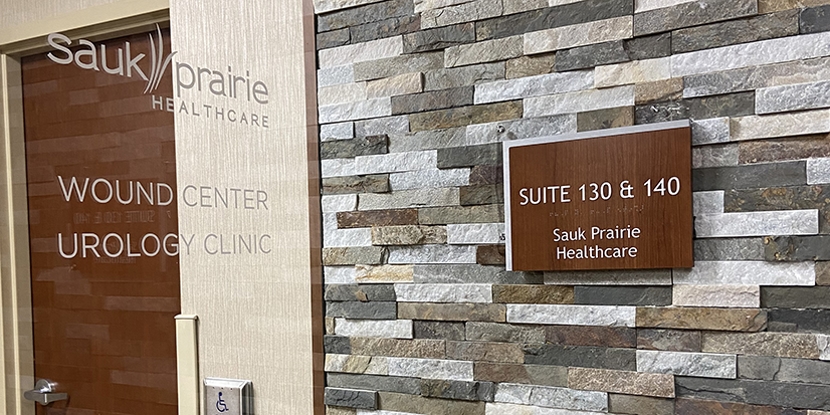
Overactive Bladder
Call 608-643-7262 to schedule a Urology appointment.
Do you often feel a sudden, uncontrollable urge to urinate? If so, you may have a condition called overactive bladder.
Overactive bladder, OAB , is extremely common. But many people who have this condition don’t seek medical attention — usually due to embarrassment or a belief that treatment isn’t available.
Unfortunately, without treatment, overactive bladder can quickly become a major, life-altering issue. Sometimes, people with overactive bladder will start to isolate themselves and refuse to participate in social activities. They fear their friends and family members may notice their frequent visits to the bathroom. Careers can even be affected, as overactive bladder may interfere with job performance or a person’s willingness to participate in presentations, business trips, etc.
If you’re one of these people who are quietly suffering from overactive bladder, we’re here to tell you that help is available. And with millions of fellow Americans also afflicted with this condition, you don’t need to feel embarrassed or alone.
Overactive Bladder Symptoms
Overactive bladder causes a sudden and frequent urge to urinate that feels almost impossible to control. Along with this symptom, you might also leak urine (either in large or small amounts) right after you feel the need to go. This is called “urge incontinence.”
Frequent urination — using the bathroom more than eight times in a 24-hour time period — is another common symptom of overactive bladder. Additionally, if you find yourself needing to urinate two or more times during the night (called “nocturia”), this could signify overactive bladder as well.
What are the Causes of an Overactive Bladder?
To understand the causes of overactive bladder, it’s helpful to first understand how the bladder functions under normal conditions. Here’s a quick overview: First, urine is created in the kidneys. It then flows into the bladder. As the bladder begins to fill up, signals from the brain instruct the bladder to tighten. This tightening of the bladder muscles pushes the urine into the urethra, a long tube that carries urine out of the body.
If you have overactive bladder, the bladder muscles tighten involuntarily. This can happen even when your bladder contains very little urine. It is this tightening of the bladder muscles that causes you to feel like you need to urinate.
There are different reasons for the bladder to tighten involuntarily. Nerve signals between the brain and bladder might not be working correctly. Or your bladder muscles might simply be too active.
Conditions and factors that can cause (or worsen) the symptoms of overactive bladder include:
- Diabetes
- Excess caffeine and alcohol intake
- Neurological issues (stroke, multiple sclerosis, etc.)
- Bladder problems (tumors, bladder stones, etc.)
- Medications
- Enlarged prostate
How is Overactive Bladder Diagnosed?
In the process of diagnosing overactive bladder, your doctor will likely conduct a physical exam and test your urine to ensure it’s free of blood and other irregularities.
Your doctor may also order tests to measure the speed of your urine flow, the amount of urine remaining in your bladder after urinating and the pressure of your bladder as it begins to fill.
Keeping a bladder diary (where you record the number of times you go to the bathroom and leak urine) may also help your doctor fully understand your condition and determine a proper diagnosis.
Overactive Bladder Treatments
When developing a treatment plan, your doctor will consider your overall health history, the cause of your overactive bladder and various other factors. One or more methods of treatment may be suggested. The two main categories for overactive bladder treatment include:
Behavioral Therapy for Overactive Bladder
Behavioral therapy is simply the fancy name for lifestyle modifications. To help ease your overactive bladder symptoms, your doctor may suggest that you:
-
Avoid common bladder irritants — foods and drinks.
- Caffeine, alcohol, carbonated beverages, apples, cranberries, honey, coffee, tea, citrus fruit, chocolate, spicy foods, tomatoes and sugar substitutes have all been identified as potential problem foods/drinks for people with overactive bladder. You may want to eliminate these items from your diet and then try them each individually to see if one or more could be responsible for your symptoms.
- Recording what you eat and drink in a bladder diary can also help you determine if any of these common bladder irritants are behind your frequent urges to urinate.
-
Try different bladder voiding techniques.
- One commonly-prescribed voiding technique is to urinate on a regular basis. For instance, you might be instructed to urinate every two to three hours. You should follow your schedule and try to urinate during your set times even if you don’t feel the urge to go every time.
- Deferring urination is another technique. When you feel the urge, you will try to wait a few minutes before using the bathroom. Eventually, you will be capable of delaying urination for longer time periods. (Note: Do not try this technique unless recommended by your doctor.)
- Overactive bladder double voiding is a third technique you may encounter. With double voiding, you pass urine, and then try to pass urine once again after waiting for a few seconds.
-
Do bladder exercises.
- Kegel exercises focus on your pelvic floor muscles. By strengthening these muscles with exercise techniques recommended by your doctor, you may be able to better control the involuntary tightening of your bladder.
-
Maintain a healthy weight and get the proper amount of fluids.
- Losing excess weight can take pressure off your bladder and help ease overactive bladder symptoms. Your doctor will also want to make sure you are getting an appropriate amount of fluids. If you are consuming more than the recommended amount, you may be told to reduce your fluid intake. However, if your urine is too concentrated (which can aggravate the bladder), you may actually be told not to limit your fluid intake.
These natural treatments (essentially overactive bladder home remedies) are relatively simple to implement, but make sure to speak with a doctor for proper instructions and advice on which techniques are best for you.
It’s important to note that if you are experiencing incontinence (or urinary leakage) as part of your overactive bladder symptoms, you may want to wear absorbent pads. This will allow you to carry on your daily activities without undue worries about embarrassing accidents. It’s possible the pads will only need to be worn temporarily, as the treatments listed above may eventually help you learn how to control urine leakage.
Medical Interventions
Along with lifestyle changes, medications and surgeries are also available to treat overactive bladder. Your doctor may prescribe overactive bladder medications, which help the bladder muscles relax and prevent them from tightening involuntarily. (These medications can have side effects, so tell your doctor if you notice sudden problems with dry eyes, blurry vision or constipation.)
Botox® injections may also be used to treat overactive bladder. These injections go directly into the bladder and help paralyze the bladder muscles.
Another form of treatment is nerve stimulation. This option may work well if communication problems between the bladder and nervous system are causing your symptoms.
For some people, catheters may be used to help empty the bladder. Depending on your situation and the type of catheter, you may need to wear the catheter at all times or only insert it a few times throughout the day.
In severe cases, overactive bladder surgery can be performed — either to replace an area of your bladder or to remove it entirely.
Get the Help You Need at Sauk Prairie Healthcare
With so many treatment options available, you don’t need to let overactive bladder rule your life. Get the help you need right here at Sauk Prairie Healthcare. Our Urologist will help you feel comfortable discussing your symptoms, and will develop a treatment plan that is right for you.
Together, we can take control of your overactive bladder — before your bladder takes control of you. Schedule your appointment today. Call 608-643-7262.



